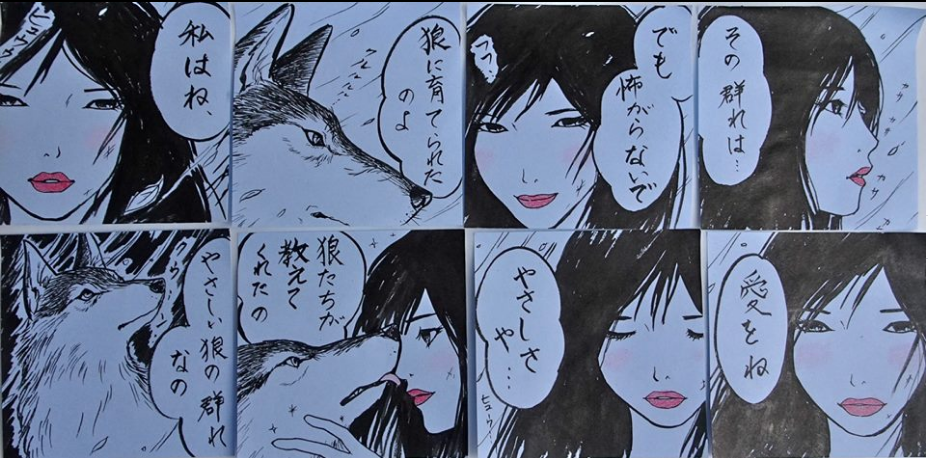The Wonderful Wolves of Yumiko Kayukawa
Back in 2011, I was fortunate enough to meet the artist Yumiko Kayukawa at her San Francisco show. I'm not the type to frequent art galleries, but somehow I had fallen in love with her work. How could I not? She depicts animals who enjoy close relationships with humans, or rather with one human (a gorgeous avatar for Kayukawa herself), while retaining their animal fierceness. On top of that, she endows her art with generous helpings of Japanese writing. It's usually playful katakana (her inventive renderings of English words), but I've seen kanji here and there.
I follow Kayukawa on Facebook and was thrilled to come across a manga that she recently posted:

I read it as best I could and, although I got the gist, I knew I was missing a lot. Indeed I was! That's what I realized after my proofreader "Lutlam" did his usual brilliant job of illuminating what Kayukawa had said. I'll give you a chance to study the manga before I share his translation, blocking the "answers" with a preview of the last essay I posted:
Okay, let's return to the manga. Here it is once more:

Reading the panels from left to right, top to bottom, Lutlam provided this translation, to which I've added vocabulary:
[PANEL 1]
WOMAN: 私はね、 (I was...)
私 (わたし: I)
SOUND EFFECT: ヒュウウ (wind blowing)
[PANEL 2]
WOMAN: 狼に育てられたのよ (... brought up by wolves.)
狼* (おおかみ: wolf, a non-Joyo kanji); 育てる (そだてる: to bring up, shown here in the past tense of its passive voice)
SOUND EFFECT: クルルル (wolf growling)
[PANEL 3]
WOMAN: でも 怖がらないで (But don't be afraid of me.)
怖がる (こわがる: to be afraid of)
SOUND EFFECT: フフ… (woman chuckling silently)
[PANEL 4]
WOMAN: その 群れは… (That pack was...)
群れ* (むれ: pack)
SOUND EFFECT: カサ カサ (leaves rustling as they fall)
[PANEL 5]
WOMAN: やさしい狼の群れなの (... a pack of kind wolves.)
やさしい* (優しい: kind)
SOUND EFFECT: クウ…ン (wolf mewling)
[PANEL 6]
WOMAN: 狼たちが 教えてくれたの (The wolves taught me...)
教える (おしえる: to teach)
[PANEL 7]
WOMAN: やさしさや… (... what it was to be kind, and...)
SOUND EFFECT: ヒュウ… (wind blowing)
[PANEL 8]
WOMAN: 愛をね (... what love was all about.)
愛 (あい: love)
Even with this full translation, I have no idea what's really behind this piece of art. But that's okay. I'm clearly not meant to know! In the meantime, I'm thrilled to see how the pervasive sound effects add another dimension to the story, rewarding the reader who also decodes on that extra level.
I can't fathom how anyone ever learns the Japanese sound effects for leaves rustling on their way down or the mewling of wolves, but I'm somehow inspired to know that the challenge awaits those with courage and curiosity!
Pruning the Shelves
In other matters of entertainment, I saw the newest work by the film director Kore-eda. The title is as follows:
「万引き家族」
The Shoplifting Family
万引き (まんびき: shoplifting; shoplifter); 家族 (かぞく: family)
The English version is simply called Shoplifters.
Incidentally, I alluded to the title in my latest newsletter contest. Here's what I said:
In gardening and farming, 間引き (まびき: thinning out, pruning) refers to pulling out (引) some flowers, fruits, etc., to create space (間) between those that remain. This sounds healthy and productive, but 間引き has given rise to an ateji term for a crime! Which crime do I mean:
a. murdering people
b. stealing merchandise from stores
c. stealing cars
d. vandalizing property
Hint: The ateji term (which sounds a lot like まびき) has a different first kanji (not 間), followed by 引き.
Even bigger hint: This ateji term is in the title of a movie by the director Kore-eda!
I never reveal contest answers before the next newsletter comes out, but I'll make an exception this time! The answer is b. Just as gardeners and farmers pull out (引) flowers, fruits, etc., to make space (間) between them in an act called 間引き, shoplifters make more space between the goods on the shelves! How considerate of them!
An Auspicious Accumulation
I very much enjoyed the movie, and part of the thrill was listening to the language and seeing what I could grasp. This time there was an extra bit of excitement in that sense.
Hours before going to the theater, I worked on defining 積. (As I've mentioned, there's a huge project going on behind the scenes in which Lutlam and I are choosing the most important definitions for all 2,136 kanji. On this site, when a Character Home Page URL includes the word "temp," as is true for 積, that means that we've finalized the definitions but that I haven't yet published an essay.) In scrutinizing 積 that day, I came across 積もる (つもる: to accumulate, pile up) and marveled that it had any connection to 積もり (つもり: intention), which people use when stating their intention to do something—such as defining 2,136 kanji! It seems that 積もり comes from “what one has accumulated in one's mind"! By the way, we ended up defining 積 this way: accumulation; load; shipment; intention; product (in math).
Anyway, two characters in the movie wander outside during a snowstorm, and one says 積もった in reference to the snow that has accumulated! If I hadn't worked on definitions that morning, I wouldn't have caught the word!
At another point in the film, the same character actually talks about kanji. Someone asks him how to write the name Shibata Shota. The character says (and I'm working from memory here), “Shibata, the usual way, like the famous baseball player. And then sho like 'sheep,' and ta like 'fat.'” I couldn't wait to go home and type that because I could envision only the last kanji.
Here's what he meant: 柴田祥太. What a relief to find out at last!
I know the non-Joyo 柴 from 柴犬 (しばいぬ), the very cute foxlike dog native to Japan. I wrote about that term in essay 1335 on 芝 (lawn grass), as 芝 has the Joyo kun-yomi しば, and I wanted to distinguish between the two types of しば. As for 祥, that means "auspiciousness; happiness," which I know because we finalized those definitions for essay 1398 on 祥!
Whenever I come full circle with all these explorations, the accumulation of knowledge feels auspicious and happy indeed!
Catch you back here next time!
❖❖❖
Did you like this post? Express your love by supporting Joy o' Kanji on Patreon:



Comments